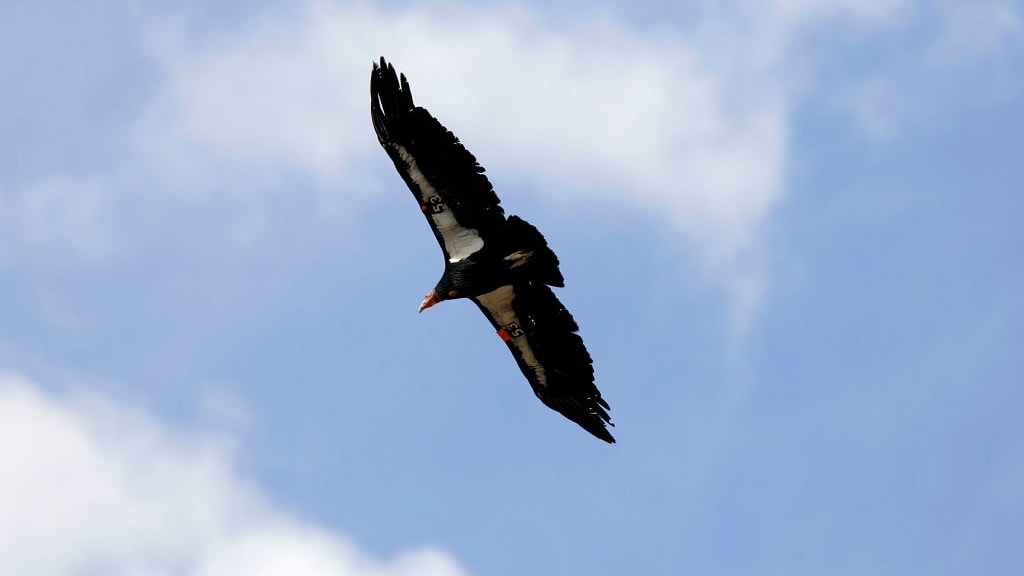California condors make a triumphant return to the northern coastal redwoods


A free daily email with the biggest news stories of the day – and the best features from TheWeek.com
You are now subscribed
Your newsletter sign-up was successful
California condors are back soaring over the Redwood National Park in Northern California, more than 130 years after they were last spotted in the area.
On Tuesday, four condors bred in captivity were put in a staging area with a remote-controlled gate. After the gate was open, two of the condors took their time peering out before finally making their way through the opening and flying away. The other two will have another chance to take off in the near future, The Associated Press reports.
The California condor is a New World vulture and the largest North American bird. Starting in the mid-1800s, their numbers began to dwindle, largely due to the condors being shot for sport, the introduction of pesticides like DDT, and habitat destruction. When the wild population dropped to just 22 in the 1980s, biologists started captive-breeding programs at the Los Angeles and San Diego zoos. These programs are working; today, the Los Angeles Times reports, there are 300 wild California condors in the state.
The Week
Escape your echo chamber. Get the facts behind the news, plus analysis from multiple perspectives.

Sign up for The Week's Free Newsletters
From our morning news briefing to a weekly Good News Newsletter, get the best of The Week delivered directly to your inbox.
From our morning news briefing to a weekly Good News Newsletter, get the best of The Week delivered directly to your inbox.
California condors are social and learn from their elders, and while in captivity, the young birds were raised by an older condor. They will be monitored by experts to ensure they are adapting to the wild.
The birds were released at a facility within Yurok ancestral territory, and the tribe's wildlife coordinator, Tiana Williams-Clausen, said in a statement that the condor's reintroduction is part of an "obligation to bring balance to the world. We've been working toward these releases for 14 years. Now, the condor is coming home."
A free daily email with the biggest news stories of the day – and the best features from TheWeek.com
Catherine Garcia has worked as a senior writer at The Week since 2014. Her writing and reporting have appeared in Entertainment Weekly, The New York Times, Wirecutter, NBC News and "The Book of Jezebel," among others. She's a graduate of the University of Redlands and the Columbia University Graduate School of Journalism.
-
 Political cartoons for February 16
Political cartoons for February 16Cartoons Monday’s political cartoons include President's Day, a valentine from the Epstein files, and more
-
 Regent Hong Kong: a tranquil haven with a prime waterfront spot
Regent Hong Kong: a tranquil haven with a prime waterfront spotThe Week Recommends The trendy hotel recently underwent an extensive two-year revamp
-
 The problem with diagnosing profound autism
The problem with diagnosing profound autismThe Explainer Experts are reconsidering the idea of autism as a spectrum, which could impact diagnoses and policy making for the condition
-
 Blue Origin launches Mars probes in NASA debut
Blue Origin launches Mars probes in NASA debutSpeed Read The New Glenn rocket is carrying small twin spacecraft toward Mars as part of NASA’s Escapade mission
-
 Dinosaurs were thriving before asteroid, study finds
Dinosaurs were thriving before asteroid, study findsSpeed Read The dinosaurs would not have gone extinct if not for the asteroid
-
 SpaceX breaks Starship losing streak in 10th test
SpaceX breaks Starship losing streak in 10th testspeed read The Starship rocket's test flight was largely successful, deploying eight dummy satellites during its hour in space
-
 Rabbits with 'horns' sighted across Colorado
Rabbits with 'horns' sighted across Coloradospeed read These creatures are infected with the 'mostly harmless' Shope papilloma virus
-
 Lithium shows promise in Alzheimer's study
Lithium shows promise in Alzheimer's studySpeed Read Potential new treatments could use small amounts of the common metal
-
 Scientists discover cause of massive sea star die-off
Scientists discover cause of massive sea star die-offSpeed Read A bacteria related to cholera has been found responsible for the deaths of more than 5 billion sea stars
-
 'Thriving' ecosystem found 30,000 feet undersea
'Thriving' ecosystem found 30,000 feet underseaSpeed Read Researchers discovered communities of creatures living in frigid, pitch-black waters under high pressure
-
 New York plans first nuclear plant in 36 years
New York plans first nuclear plant in 36 yearsSpeed Read The plant, to be constructed somewhere in upstate New York, will produce enough energy to power a million homes
